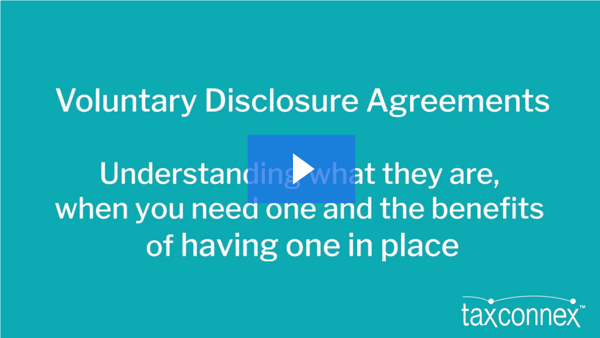Sales Tax Scaries 4: Nexus and Taxability
When Sales Tax Creeps Up on You
Ever notice how the first characters in every horror movie never...

Is a Voluntary Disclosure Agreement right for you? Voluntary Disclosure Agreements (VDAs) can be an effective tool in mitigating prior-period sales tax exposure, however, it may not always be the best solution.

What is a VDA and what does it mean? A voluntary disclosure agreement (VDA) is a legal means for taxpayers to self-report back taxes owed for income, sales, property, and other tax types. In exchange for voluntarily reporting the tax due, states generally grant a waiver of penalty and also a limited look back period (generally 3-4 years), potentially reducing the tax due significantly as compared to an audit. If back taxes are not disclosed, but are instead discovered through an audit, the taxpayer is at a disadvantage and will end up being assessed various penalties plus interest plus all historical tax due.
If your sales taxes are delinquent, filing a VDA could be a smart business decision. If you own a small company, the penalties levied by governments in an audit could do serious damage to your financial stability.
The first step in the VDA process is a cost/benefit analysis. To start, you need to look at the three primary objectives in pursuing a VDA:
Elimination of liabilities prior to the look-back period. This is the most significant/valuable element of the VDA. Assuming you haven’t collected the taxes, the state will waive its right to collect any voluntary disclosure agreement sales tax exposure prior to the look-back period. For example, if you have $1mil in total tax liability and $800,000 of that is beyond the look-back period, the state is going to forgive that portion of the liability. In this situation, the taxpayer would only remit the $200,000 within the look-back period plus interest.
Establish the company as compliant for all prior periods for sales and use tax purposes. Essentially, under due diligence by an acquiring entity or for financing purposes, the company can represent that it is compliant with all sales and use tax laws. The states can always audit the VDA periods, but so long as there are no material or intentional misstatements of fact, the state will not audit beyond the look-back period.
Penalty abatement. While some companies might think of this as the primary benefit of the VDA process, it’s really the byproduct of the VDA process. In most situations and in most states, if you don’t mitigate the exposure via the VDA process and are audited, the state would likely grant some level of penalty relief anyway. As a result, the penalty abatement is valuable, but less valuable than the first two considerations above.
If the above objectives are what you are hoping to accomplish, a VDA may be the right decision. If you need help understanding what’s best for your business or would like to discuss if you qualify for a VDA, reach out to a sales tax expert to help alleviate the burden and make sure you are making the best decision.
Contact TaxConnex to understand the sales tax compliance process and let us manage your VDA for you.
Learn more about VDAs in our recent video:

Ever notice how the first characters in every horror movie never...
Copyright © 2025 TaxConnex, LLC